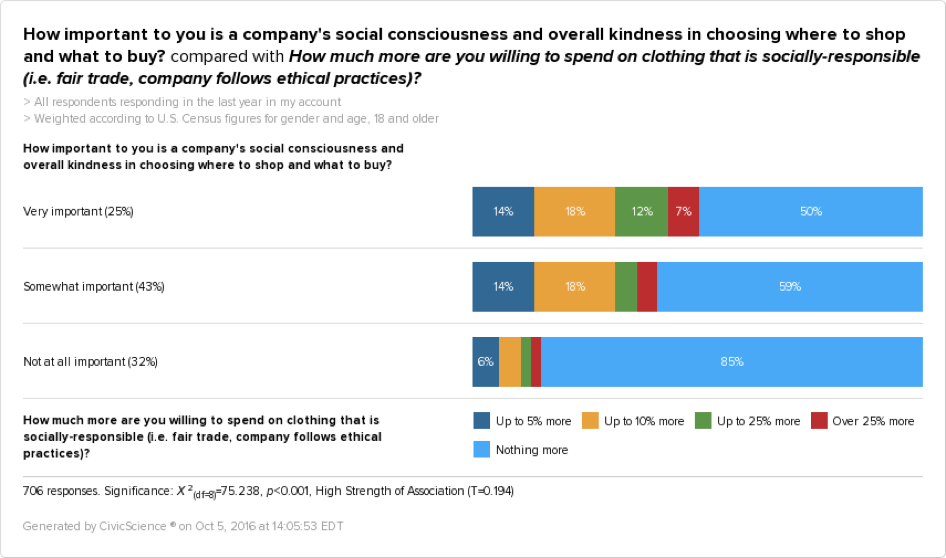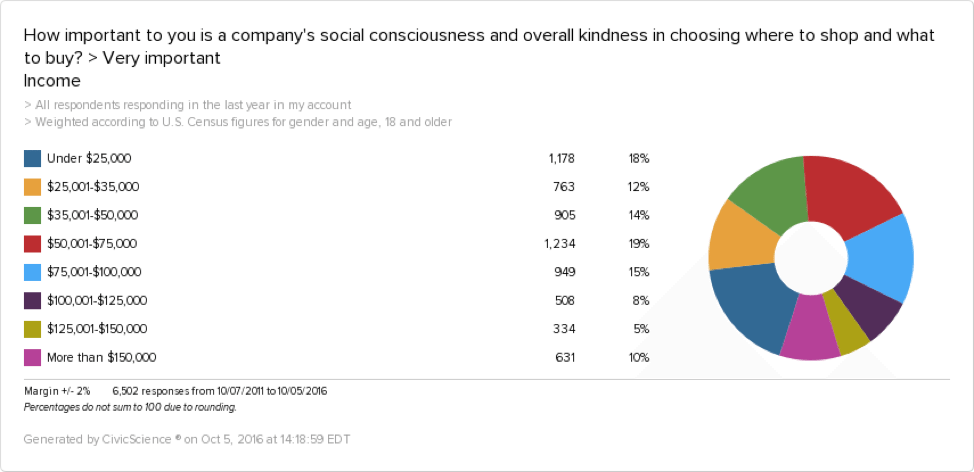Many stories have come out recently about the safety and welfare of workers, so it’s easy to see why there has been increased buzz about Corporate Social Responsibility (CSR), and company policies that affect the health and safety of workers. Many businesses have been getting heat for their not-so-great track record on sweatshops, while businesses like American Apparel have gone sweatshop-free. Some businesses, such as Toms, have even sprouted with the implicit goal of being socially-responsible.
Corporate Social Responsibility encompasses other policies outside of sweatshops and working labor, but workplace safety is a main focus for many apparel and retail businesses.
We wanted to find out how important a company’s social consciousness is to consumers, and whether or not this informs their purchasing decisions.
As we can see, 73% of U.S. adults care at least somewhat about a company’s social consciousness when choosing where to shop and what to buy.
That’s great and all, but do they put their money where their mouths are?
Unfortunately social consciousness, and businesses that prioritize Corporate Social Responsibility, frequently come with a higher price tag. It’s much cheaper to make clothes when labor is cheap, and when ethical standards are lower. Are people willing to pay up to support a cause that they care about?
As you can see, there is a strong correlation between those who care about social consciousness, and the extra money they are willing to spend for clothing that is socially-responsible. 7% of those who answered “very important” to the former question would pay over 25% more for socially-responsible clothing, and 12% would pay up to 25% more.
Those who would pay up to 5% or 10% more are identical among those who consider a company’s social consciousness either very or somewhat important.
As we might expect, 85% of those who answered “Not at all important” to the first question would not pay anything more for socially-responsible clothing.
The Conflicting Numbers on Corporate Social Responsibility
The group that considers a company’s social consciousness very important is exactly halfway split between those who would pay more for socially-responsible clothing and those who wouldn’t. So, there are different ways to look at these numbers – it’s a classic, “Is the glass half empty, or half full?”
It is fantastic that many consumers are willing to pay more for clothing they ethically support, though it’s disconcerting that 50% of these socially-conscious consumers are not willing to pay more.
I have to ask, is it that these consumers do not want to pay, or cannot afford to?
As it turns out, many of these consumers may not be able to pay extra for the socially-responsible clothing that they may morally align with. 18% of this group earns below $25k, and as a whole, this group is less likely to earn over $100k, and is more likely to earn under $50k.
What This Means for Businesses
Businesses want to make consumers feel good about what they are supporting and the products they purchase. Therefore, ones that can bridge this gap of intent vs. income may find a strong base of consumers. These folks may be excited to find products that best match their values and their price point. Not to mention the positive impact these businesses would have on the world around them.
However, if retail businesses plan to charge over 10% for clothing because it is more socially-conscious, they can naturally expect to find less consumers willing to pay. If they keep their prices within 5-10% of other clothing, however, they can expect to bring in large numbers of consumers, from those who care about social consciousness to those who don’t. This parallels past research we’ve done, showing that today’s companies and CEOs have a significant financial incentive to support the causes that they care about.











